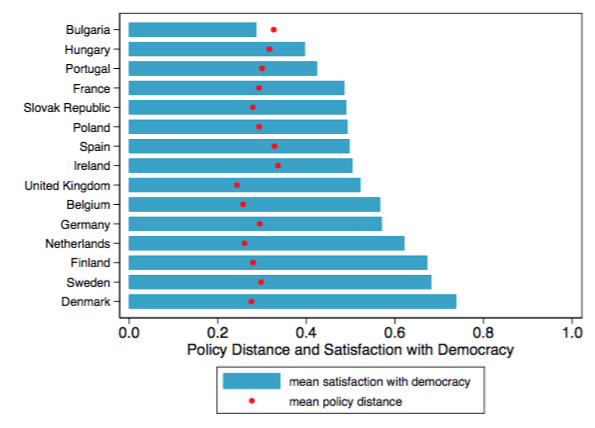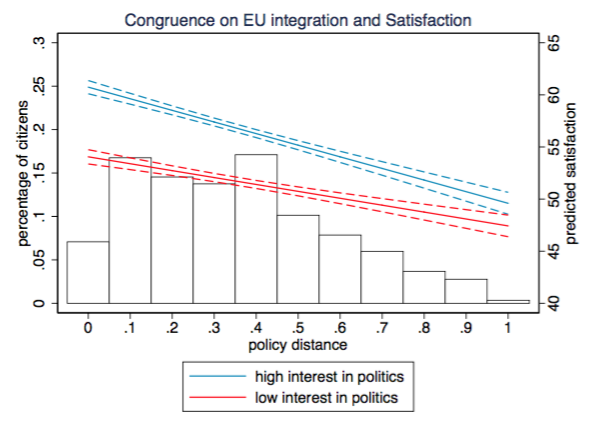The Danish effect: when citizens agree with public policy, they’re satisfied with democracy too
Inevitably, most of the people who didn’t vote for the party or parties in power will be less happy with the policies they implement. But in a survey of European countries, Christian Stecker and Markus Tausendpfund found this dissatisfaction extends to their opinion of the state of democracy in general, particularly when the government’s policies on redistribution and EU integration deviate greatly from their own. And while some countries do well when it comes to overall satisfaction – such as Sweden and Denmark – others, like Bulgaria, fare much worse.

A would-be councillor with a campaign bus in Odense, Denmark. Photo: Enhedslisten via a CC-BY-NC 2.0 licence
When citizens are asked about the quality of their country’s democracy, they think about different things. On the one hand, they consider whether the democratic procedures are fair and unbiased. The number of wasted votes in elections or the influence of (unelected) lobbyists are important indicators in this regard. On the other hand, they think about what they get out of the democratic process. Here, economic growth or the level of corruption are relevant.
Furthermore, citizens care about how well the government reflects their personal policy preferences. In our research, we investigated how much satisfaction with democracy decreases when the government deviates from citizens’ personal views on policy. We included deviations on a general left-right-axis and on the issues of redistribution, European integration, same-sex marriage, immigration and environmental protection.
To measure citizens’ stances on these issues and their satisfaction levels we used data from the European Social Survey, a large biannual survey that includes almost all European countries. Approximations for the policy positions of governments were calculated with the help of the Chapel Hill Expert Survey, for which political scientists around the world rate the policy positions of individual parties. It needs to be emphasised, however, that our measure of government positions can only be taken as the best available guess as no comparative data on real government policies exists. Altogether our dataset includes 45,002 citizens and 31 governments in 15 Western and Central Eastern European countries.

Our results show that the congruence between what citizens want and what they get from their governments varies considerably across countries and issues. This is illustrated in the figure on the left. The dots represent the mean policy distance between citizens and the government across all issues, whereas the bars represents the average satisfaction in a country. Both measures are standardised on a 0-1 scale. As we know from other studies, there is a considerable variation in citizen satisfaction with democracy across countries – with higher values in Western Europe, particularly Scandinavia, and lower values in Central Eastern Europe, particularly Bulgaria. Interestingly Scandinavian countries – but also the UK and the Netherlands – seem to fare well when it comes to the congruence between citizens and governments.
At closer inspection, the results corroborate our expectation that citizens become less satisfied with the way democracy works when the government pursues deviating policies on different issues. This satisfaction-decreasing effect is particularly present for incongruences on a general left right-axis, redistribution and European integration. A perfectly anti-EU citizen, for example, will lose around nine points on the 0–100 satisfaction-scale when she or he is facing a perfectly pro-integrationist government and vice versa. When it comes to same sex marriage, immigration and environmental protection the effects are smaller and less certain.
These results attest to the fact that most people’s political judgments are at least partly guided by a somewhat egocentric perspective. Citizens who are in a clear minority position usually have – in a democracy – no legitimate claim that their preferences prevail over those of the majority. Yet these citizens nevertheless seem to give lower scores for the democratic performance of their country when the government has different views on policy. Furthermore, the perceived state of the economy has a much stronger effect on people’s satisfaction with democracy than policy distances do.
Moreover, the effect of government-citizen congruence on satisfaction with democracy is not the same for everyone. When the government deviates from their policy views, the drop in satisfaction is more pronounced among people who are more interested in politics. Interestingly, the politically-engaged are also more sensitive to incongruences on specific issues such as environmental protection, about which the least interested do not seem to care.
The role of political interest is visualised in the following figure. The vertical axis gives the range of the potential deviation between a citizen and the government on the issue of European integration. The bars show how the 45,002 citizens in our sample are distributed across that range. The blue line (with dotted confidence intervals) represents the statistically predicted satisfaction with increasing policy distance for citizens with high interest in politics. The red line gives the corresponding values for citizens who consider themselves to have a low interest in politics.

Satisfaction decreases for everyone, no matter how great their interest in politics, when the government deviates from their views on European integration. However, the slightly steeper decrease of the blue line visualises how much more sensitive the more politically-engaged are when it comes to incongruences. We also find this moderating influence of political interest in the other issues we cover.
In a nutshell, our research has shown that the congruence between citizens and governments across different issues is an important factor in citizens’ satisfaction with their democracy. Therefore (and for other normative reasons) it is desirable that the democratic process facilitates a good match between the preferences of citizens and government policy. This may be achieved by designing democracies in a specific way. Furthermore, the willingness of politicians to build flexible majorities on different issues in parliament may contribute to a better congruence.
This post represents the views of the author and not those of Democratic Audit.

 Christian Stecker (above) is a Research Fellow at the Mannheimer Zentrum für Europäische Sozialforschung (MZES), University of Mannheim.
Christian Stecker (above) is a Research Fellow at the Mannheimer Zentrum für Europäische Sozialforschung (MZES), University of Mannheim.
Markus Tausendpfund is a researcher in quantitative methods in the Faculty of Humanities and Social Sciences, FernUniversität in Hagen.





 Democratic Audit's core funding is provided by the Joseph Rowntree Charitable Trust. Additional funding is provided by the London School of Economics.
Democratic Audit's core funding is provided by the Joseph Rowntree Charitable Trust. Additional funding is provided by the London School of Economics.
The Danish effect: when citizens agree with public policy, they’re satisfied with democracy too https://t.co/L9VfBNzwud
The Danish effect: when citizens agree with public policy, they’re satisfied with democracy too https://t.co/bIBsnHtTV0
The Danish effect: when citizens agree with public policy, they’re satisfied with democracy too: https://t.co/zdWwOEd2e4
The Danish effect: when citizens agree with public policy, they’re satisfied with democracy too https://t.co/gYn3UAtifg
The #Danisheffect: when citizens agree with #public #policy, they’re satisfied with #democracy too: https://t.co/9N96Su25P2
@democraticaudit
The Danish effect: when citizens agree with public policy, they’re satisfied with democracy too https://t.co/w37DnHRAsA
@democraticaudit
Democracy is only tolerable/tenable if you can trust the electorate not to vote for things directly against your interests
The Danish effect: when citizens agree with public policy, they’re satisfied with democracy too https://t.co/IoXRBV4gBF
The Danish effect: when citizens agree with public policy, they’re satisfied with… https://t.co/w37DnI9bk8 https://t.co/sjEKfTsePE